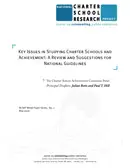This white paper from the Charter School Achievement Consensus Panel examines the existing research on student achievement in charter schools and details how future research could be improved.
Consensus Panel members reviewed and rated more than 40 evaluations of charter school performance released between 2000 and 2005. They found that the studies evaluating charter schools nationally or across states were all “fair” to “poor.” Increasingly rigorous methods were more common in those studies evaluating charter schools within a particular state, but findings from state-specific studies cannot be easily generalized to charter schools nationally. This is because charter school laws and oversight vary so widely from state to state.
Two key findings from the Consensus Panel’s report are that 1) no one research method or approach is problem-free, and 2) the results of studies focused on one kind of charter school cannot be generalized to all charter schools. Therefore the Panel recommends that the research community and other audiences should consider the pattern of results from multiple studies instead of relying on a single study for definitive results.
The Charter School Achievement Consensus Panel includes nine outstanding researchers from different methodological traditions who, despite differing views on charter schools, all agree on the importance of improving the quality of research on charter school outcomes. Convened by the University of Washington’s National Charter School Research Project in early 2005, the goal of the Consensus Panel is to improve the quality of future charter school research.
Members include:
Julian Betts, University of California, San Diego
Dominic J. Brewer, University of Southern California
Anthony Bryk, Stanford University
Dan Goldhaber, University of Washington
Laura Hamilton, The RAND Corporation
Jeffrey R. Henig, Columbia University
Paul T. Hill, University of Washington
Susanna Loeb, Stanford University
Patrick McEwan, Wellesley College





